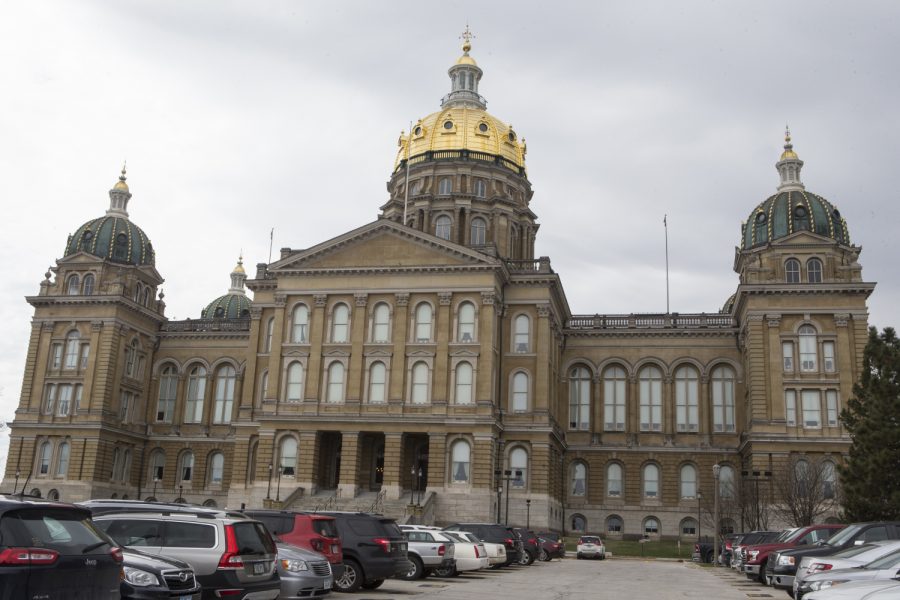Iowa legislative leaders to look at mental-health funding, won’t rule out election law changes in 2021 legislative session
Legislative leaders from both major parties said they wanted to review how the state funds mental-health services, and wouldn’t be opposed to changing election laws as the beginning of the legislative session approaches.
The Iowa State Capitol building is seen in Des Moines on April 9, 2019.
January 7, 2021
Iowa Republican and Democratic legislative leaders discussed potential objectives for new legislation regarding election law and alternative avenues for funding state mental-health services during a virtual press forum on Thursday.
Senate Majority Leader Jack Whitver, R-Ankeny, and Speaker of the House Pat Grassley, R-New Hartford, didn’t commit to avoid adding voting restrictions in the wake of the 2020 election. The Republican leaders were asked if they would pledge to not increase restrictions on early and absentee voting over the course of the 2021 legislative session, to which they said they felt confident in current Iowa election laws but would ultimately let voter confidence be the driving factor in any new election legislation.
“I think, if anything, the 2020 election taught us election law matters, and having safe, secure elections that Iowans believe in and believe the results of is paramount,” Whitver said. “That’s why we’ve worked so hard on election law the last few years and I believe the measures that we have put in place have led to safe, secure, predictable elections.”
Whitver referred to Iowa Supreme Court decisions to sustain a law preventing auditors from filling in missing voter information with information in the state’s voter registration database. He also cited an earlier decision giving Secretary of State Paul Pate permission to prevent auditors from distributing pre-filled absentee ballot forms to registered voters.
“There were some problems in the absentee process and it was notably auditors that were going rogue and trying to skirt the basic law…and luckily the courts stepped in and made good, rational decisions to stop that,” Whitver said. “All we’ve ever said we wanted is a fair playing field that is consistent and predictable across the state so that both parties know what the rules of the game are before the game starts.”
RELATED: Reynolds won’t reintroduce Invest in Iowa Act in upcoming legislative session
Whitver said establishing consistent statewide regulations on absentee voting and looking further into election recounts like that of Iowa’s 2nd Congressional District race are areas where lawmakers may look to change election laws.
Referring to the 2nd District election, Senate Minority Leader Zach Wahls, D-Coralville, said it was important for Democrats and Republicans to agree on the importance of counting every legally cast vote, and that current Iowa election law didn’t allow auditors enough time to count those votes.
“I certainly would be happy to work together to try and remove that arbitrary deadline so that, you know, hopefully we never have a six-vote margin again in the future,” Wahls said. “I cannot imagine what this has been like for Representative Miller-Meeks and for Senator Hart to go through.”
Leaders also discussed plans for funding Iowa mental-health services in the upcoming year, in which Whitver said he’d like to continue looking into funding mental-health services with money not collected from property tax.
“Iowa is one of the few states that uses property taxes to fund social service programs like mental health, and if Iowans are wondering why their property taxes are so high, it’s because we have so many different streams of tax revenue going into property tax,” Whitver said.
According to The Des Moines Register, a majority of mental-health services in Iowa are funded by property tax, which was slated to change to being funded by state sales tax in a tax proposal sponsored by Governor Kim Reynolds prior to the pandemic.
Whitver said tough budgeting decisions made on behalf of Iowa Republicans have given the state leniency in deciding how to invest in state services moving forward.
RELATED: Republican legislative leaders won’t require masks for upcoming session
“I would like to move mental health off of property taxes,” Whitver said. “It may not happen all in one year, it may take more than one year to do that but I think that’s a win-win for more money for mental health and less property taxes for Iowans.”
Aside from separating property taxes and mental-health funding, Grassley said the quickest way to take pressure off of mental-health services is to get kids back in school full-time.
“I’ve heard from so many constituents and I’ve talked to my colleagues that the burdents it’s placing on families…I think that’s when you talk about mental health,” Grassley said. “I get the property tax thing and we obviously want to work on getting that off at the local level, but as far as the use of our services, I think that is the quickest thing we can do to help.”
House Minority Leader Todd Prichard, D-Charles City, said many school districts have stepped up during the pandemic in terms of providing additional resources to families like hybrid learning programs and was happy to hear Grassley mention the mental-health benefit associated with getting kids back in school.
“It really speaks to the need to make sure that we are funding our priorities in terms of taking care of the people of Iowa…that’s really where we’re focused on and want to see accomplished with the budget,” Prichard said.



